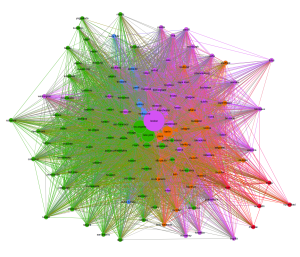[Cross-posted from http://valuingelectronicmusic.org/2014/09/08/geography-soundcloud-following/]
Wanting to find out what was typical SoundCloud behaviour – as opposed to what our case study users were doing – we took a random sample of 150000 SoundCloud accounts earlier this year and downloaded their profile data, plus the profile data of everyone they were following (plus some other stuff, but that’s for another time). One of the things we did with this data was to construct a social network graph showing ‘follow’ relationships at city level: every time our computer program found that a sampled user self-identified with city A followed a user self-identified with city B, it created an ‘arc’ (represented with an arrow) from city A to city B. We then combined all the arcs so that instead of, say, 2000 arcs from city A to city B, there would now be a single arc with a ‘weight’ of 2000. We then imported this data into Gephi, sized the nodes representing cities to reflect the total weight of all the incoming arcs, positioned them with the Force Atlas algorithm, and used the Louvain community detection method to identify ‘clusters’, where a cluster is a group of nodes that are better connected to each other than they are to nodes from outside the group. And here’s the result, with five colours to represent the five clusters.
Continue reading “The geography of SoundCloud: who’s following whom?”
